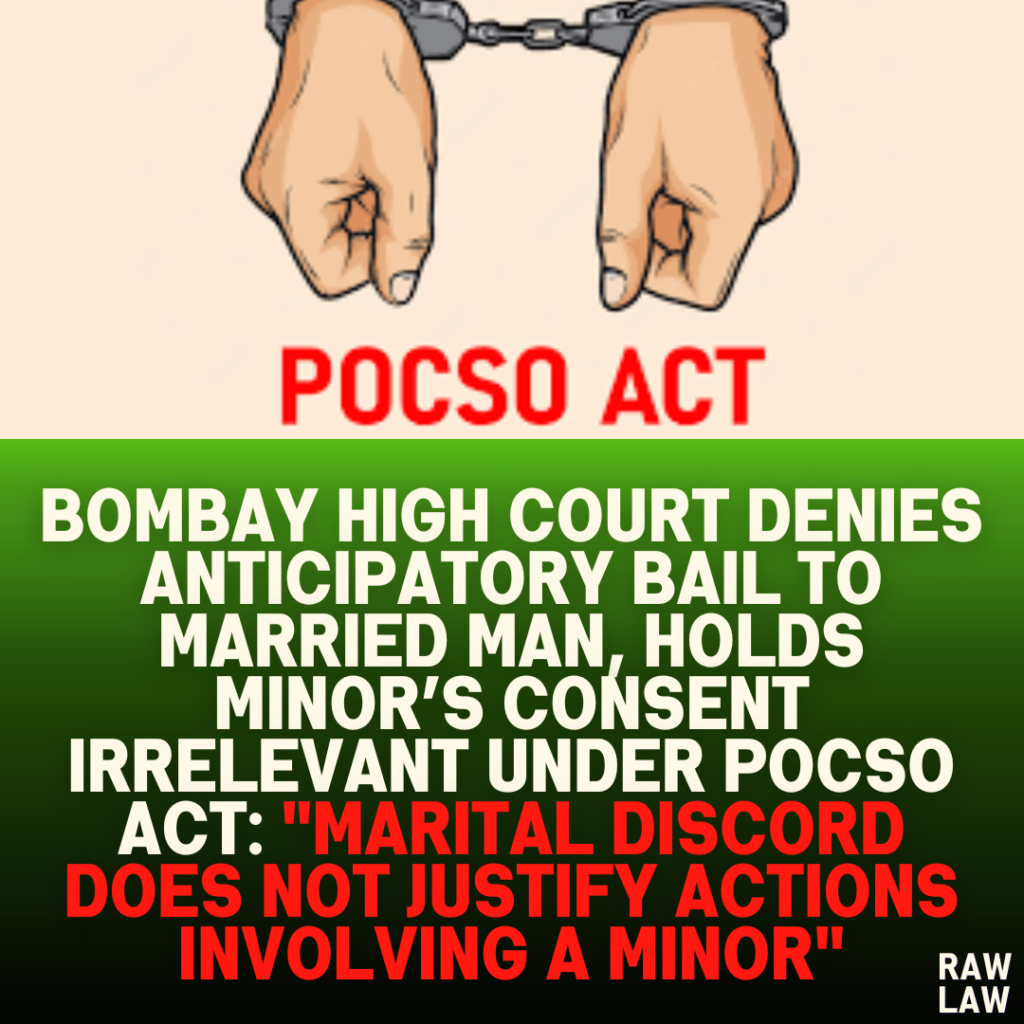Court’s Decision:
The Bombay High Court dismissed the anticipatory bail application filed by the applicant, who was facing charges under Sections 366 and 376(2)(n) of the Indian Penal Code (IPC) and Sections 4 and 8 of the Protection of Children from Sexual Offences Act, 2012 (POCSO Act). The Court emphasized that since the victim was a minor at the time of the incident, her consent was irrelevant, and the applicant could not seek relief based on any claim of a consensual relationship.
Facts:
The case originated from an FIR registered under Section 363 of the IPC for the alleged kidnapping of a minor girl. Initially, the FIR was lodged after the victim’s father reported her missing. The victim was 17 years and 8 months old at the time, and the investigation revealed that she had joined the company of the applicant and traveled to various places before eventually returning to her family. Upon further investigation, Sections 366 and 376(2)(n) of the IPC and Sections 4 and 8 of the POCSO Act were added to the FIR.
Issues:
The primary issue before the court was whether the applicant, a married man, could be granted anticipatory bail, considering the victim’s age and the offenses under the POCSO Act.
Petitioner’s Arguments:
The applicant argued that the victim had joined him voluntarily, and at the time of recording her initial statement during the investigation, she did not implicate him. It was only later, in her statement under Section 164 of the Criminal Procedure Code (Cr.P.C.), that she accused him of involvement. He also claimed that the victim knew he was married and that they had been residing together, further asserting that the victim was on the verge of attaining majority, making the relationship consensual.
Respondent’s Arguments:
The state opposed the bail application, emphasizing that the victim was a minor at the time of the incident, which made her consent legally irrelevant. The prosecution highlighted the victim’s statement under Section 164 of the Cr.P.C., in which she described how she was coerced by the applicant and how he and his lawyers had advised her not to reveal the truth. The respondent stressed that a prima facie case under the POCSO Act was made out against the applicant.
Analysis of the Law:
The court analyzed the provisions of the POCSO Act, which protects minors from sexual offenses, irrespective of their consent. The law’s strict interpretation indicates that once the victim is found to be a minor, any defense based on consensual involvement is untenable. The court also referenced the applicant’s marital status, which further complicated his claims.
Precedent Analysis:
While the judgment did not directly cite prior cases, the interpretation of the POCSO Act followed established principles that prioritize the protection of minors, making their consent irrelevant in cases involving sexual offenses.
Court’s Reasoning:
The court reasoned that since the victim was a minor, her consent was inconsequential under the law, especially in light of the serious allegations under the POCSO Act. Furthermore, the court observed that the applicant was a married man, a fact which the victim was not fully aware of at the time she joined his company. The victim’s subsequent statements detailed coercion and manipulation, adding weight to the prosecution’s case. The court also noted that the applicant had not provided any substantial justification for relief, as his marital discord could not excuse his actions involving a minor.
Conclusion:
The anticipatory bail application was dismissed, with the court holding that the applicant had no grounds for discretionary relief. The court’s decision reaffirmed that the victim’s status as a minor and the serious nature of the allegations under the POCSO Act outweighed any claims of a consensual relationship.
Implications:
This ruling underscores the strict application of the POCSO Act in cases involving minors. The court’s refusal to entertain the applicant’s claims based on the victim’s alleged consent sends a strong message that such defenses hold no merit when the victim is below the age of majority. Additionally, the case highlights the court’s unwillingness to grant anticipatory bail in situations where there is a prima facie case involving sexual offenses against minors, reinforcing the legal protections afforded to children under the POCSO Act.




Pingback: Karnataka High Court Dismisses Petitions for Enhanced Compensation and Conviction Reversal in Cheque Dishonor Case, Emphasizes Timely Appeal Requirement and Upholds Statutory Presumption - Raw Law